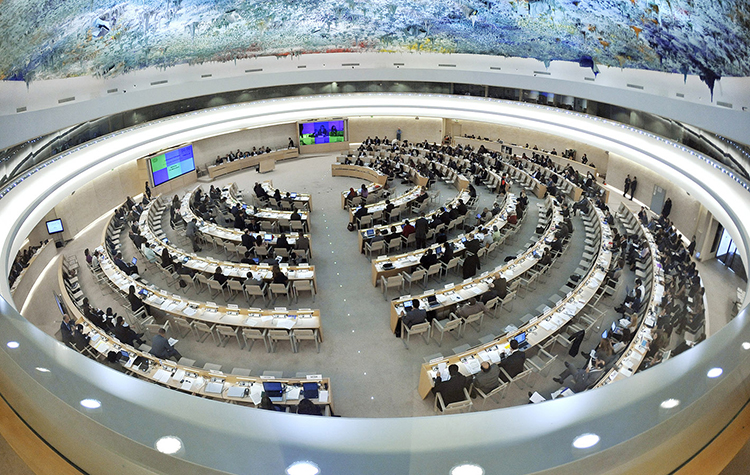FORUM-ASIA organised five side events at the 35th regular session of the UN Human Rights Council. The side events include side events on the Maldives and the Philippines, as well as thematic side events on freedom of expression, and on business and human rights. FORUM-ASIA also co-organised a side event on religion and expression online in Asia.
Extrajudicial Killings in the Philippines
FORUM-ASIA organised a side event on extrajudicial killings in the Philippines on 07 June 2017, together with Franciscans International, Global Centre for the Responsibility to Protect, Human Rights Watch, and International Federation for Human Rights (FIDH). This followed the presentation of the report of the Special Rapporteur on extrajudicial, summary or arbitrary executions, Agnes Callamard. In her report, the Special Rapporteur had mentioned killings in the Philippines in relation to the government’s ‘war on drugs’.
During the side event, Ellecer Carlos of the Philippine Alliance of Human Rights Advocates (PAHRA) and In Defense of Human Rights and Dignity Movement (iDEFEND) discussed the challenges for human rights defenders in the Philippines working against extrajudicial killings. These challenges include difficulties in engaging co-opted government institutions; attacks and political persecution against human rights defenders, lawyers, and families of victims of extrajudicial killings; and the proliferation of fake news. Furthermore, the ‘war on drugs’ has been compounded with the war on terrorism since the declaration of martial law in Mindanao in May.
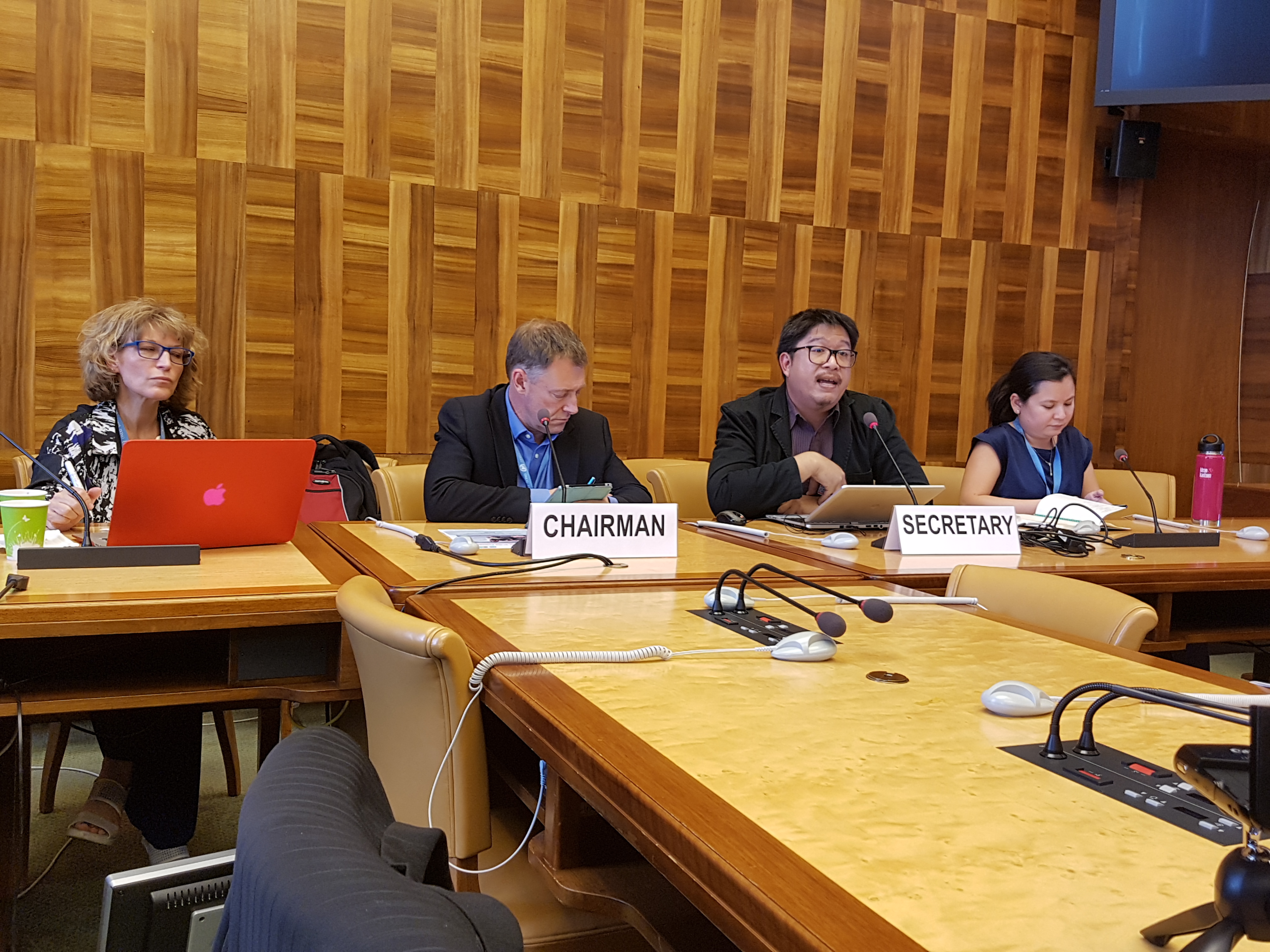
Agnes Callamard stated that from the standpoint of the mandate and from the standpoint of human rights, the situation in the Philippines has been straightforward. Whether or not these deaths were directly committed through police intervention, they are all within the government’s responsibility to investigate. She stressed the need for the principle of precaution in conducting police operations and re-thinking the current modus operandi to ensure the conditions of necessity, proportionality, and precautions. She also highlighted that based on analysis, if the situation is not addressed, this would lead to a multi-fold human rights crisis.
Rosanna Ocampo of FORUM-ASIA provided updates on how the overall human rights situation has been deteriorating, the increased attention that the Philippines has received from states at the Council, and the government’s responses to such statements. While it has been encouraging that over 30 states supported a joint statement on the Philippines at this Council session and over 45 states spoke against the ‘war on drugs’ during the Universal Periodic Review (UPR) in May, the Philippine government’s continuous defence of its ‘war on drugs’ and failure to address current issues have been disappointing.
In wrapping up the side event, John Fisher of Human Rights Watch, who served as moderator, called for concrete action at the September session of the Council, and a resolution establishing an international investigation on the killings.
Human Rights in the Maldives
Together with the International Commission of Jurists (ICJ) and International Federation for Human Rights (FIDH), FORUM-ASIA organised a side event on human rights in the Maldives on 09 June 2017. The side event aimed to draw attention to the steeply deteriorating human rights situation in the country in recent years as previously unseen levels of corruption, violence, and extremism began to surface. Human rights defenders and critics who question the government or non-state actors have faced increasingly brutal attacks. The side event was moderated by R. Iniyan Ilango of FORUM-ASIA.
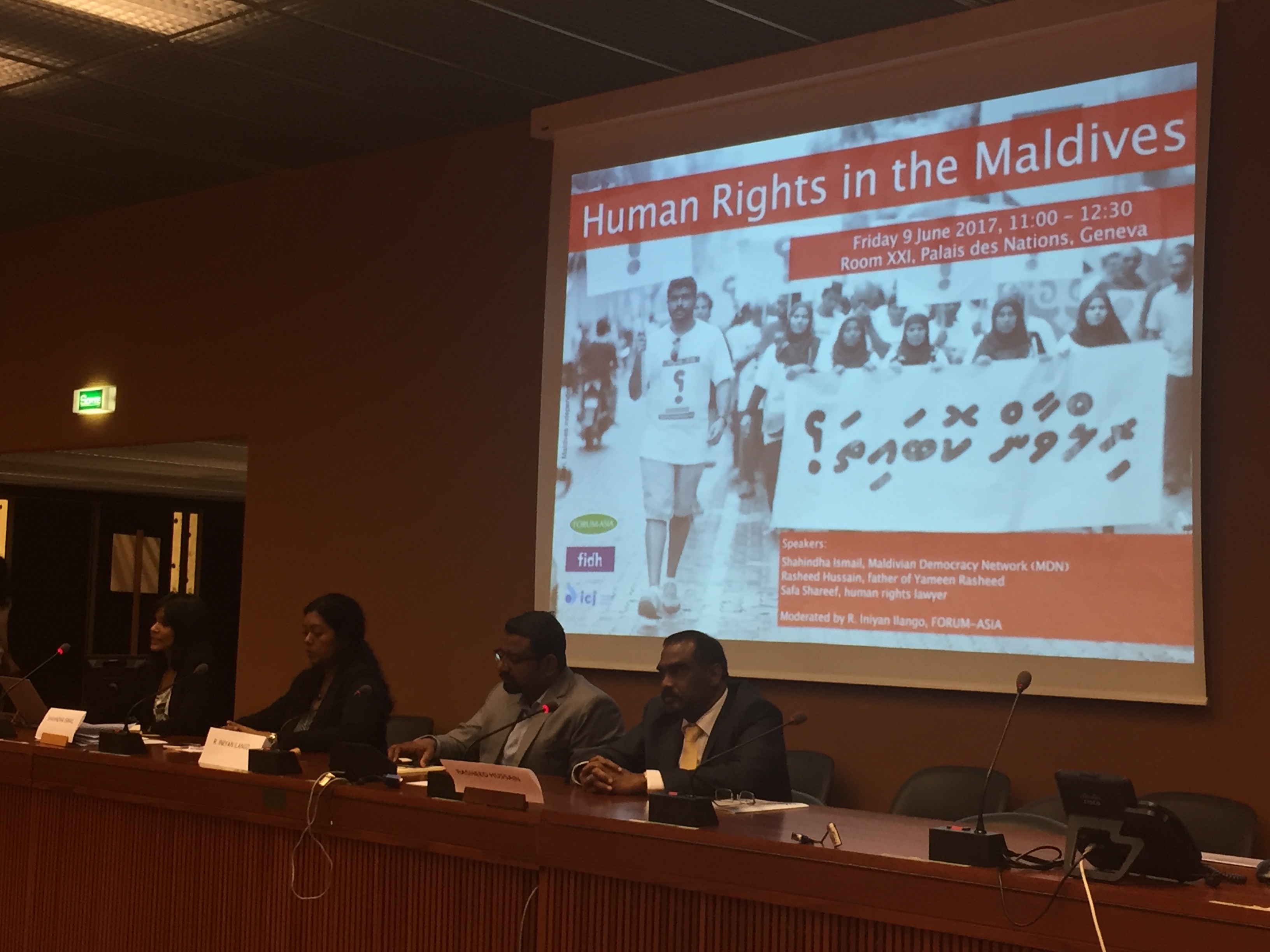
Shahindha Ismail of the Maldivian Democracy Network (MDN) gave an overview of the human rights situation in the country and the urgency of addressing challenges related to restrictions on civil society space ahead of the elections scheduled in the fall of 2018. She asked for the international community to continue monitoring the situation in the Maldives and for Special Rapporteurs to visit the country. Rasheed Hussain called attention to the murder of his son, human rights defender and blogger Yameen Rasheed, and stressed that there have been many similar cases before his son’s that have not been addressed. On behalf of the family he called for international participation in the investigation. Safa Shareef, a human rights lawyer, discussed cases of murder and enforced disappearances in the Maldives, as well as problematic legislation such as the defamation act, and freedom of expression act, which have led to individual journalists being imprisoned. She also said that it would be helpful if diplomatic missions in the Maldives are able to observe trials to monitor possible problems in the judicial system.
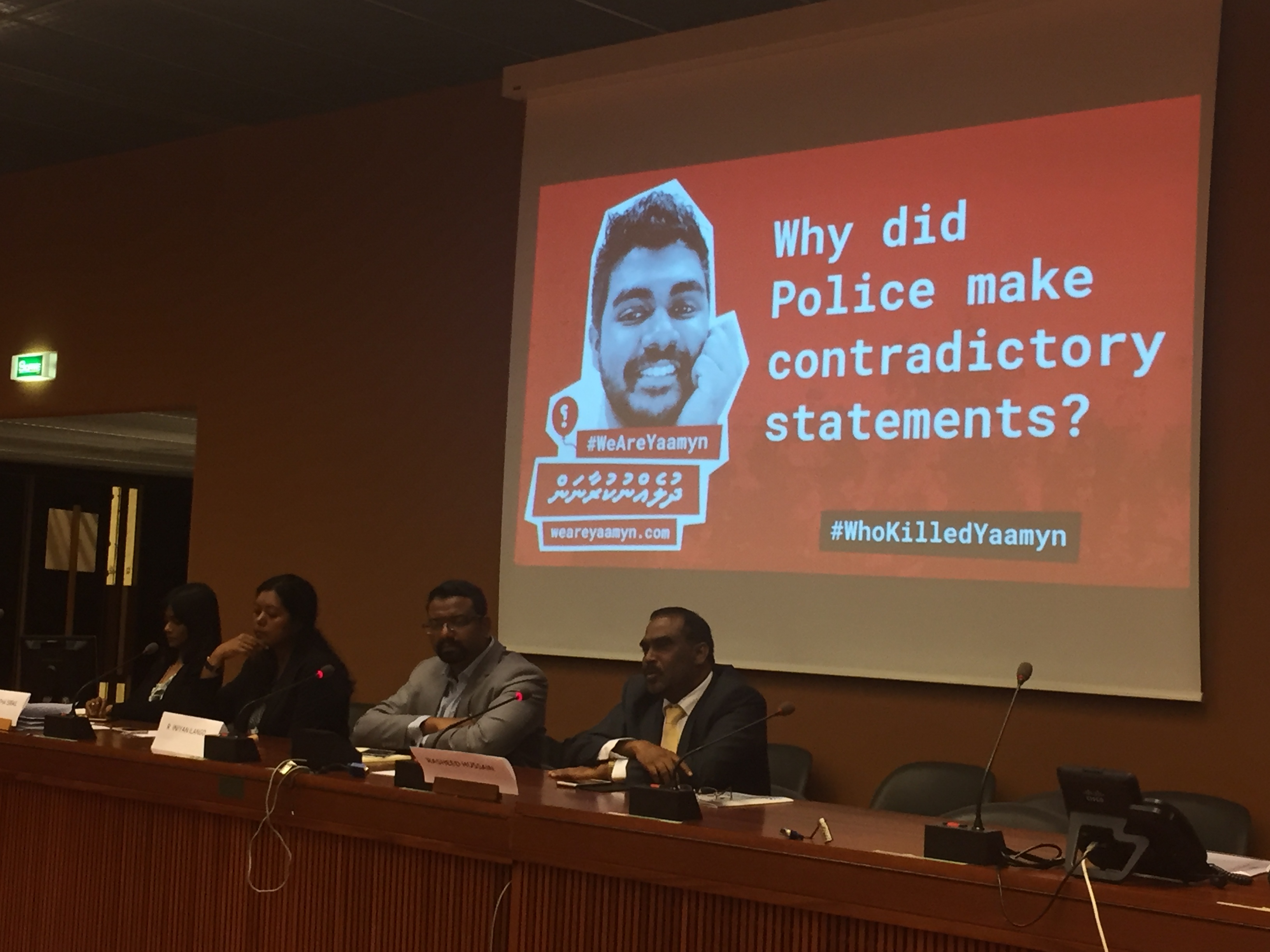
Strengthening Corporate Accountability in Supply Chains
Following the report of the Working Group on the issue of human rights and transnational corporations and business enterprises, which included its missions to the Republic of Korea and Mexico, FORUM-ASIA, together with the International Service for Human Rights (ISHR), KTNC Watch, and Good Electronics, organised a side event on strengthening corporate accountability in supply chains on 09 June 2017. The side event aimed to review current challenges, discuss recommendations of the Working Group, and strategies ways to implement these recommendations.
Michael Addo, chair of the Working Group, provided a brief summary of the Working Group’s reports on South Korea and Mexico.
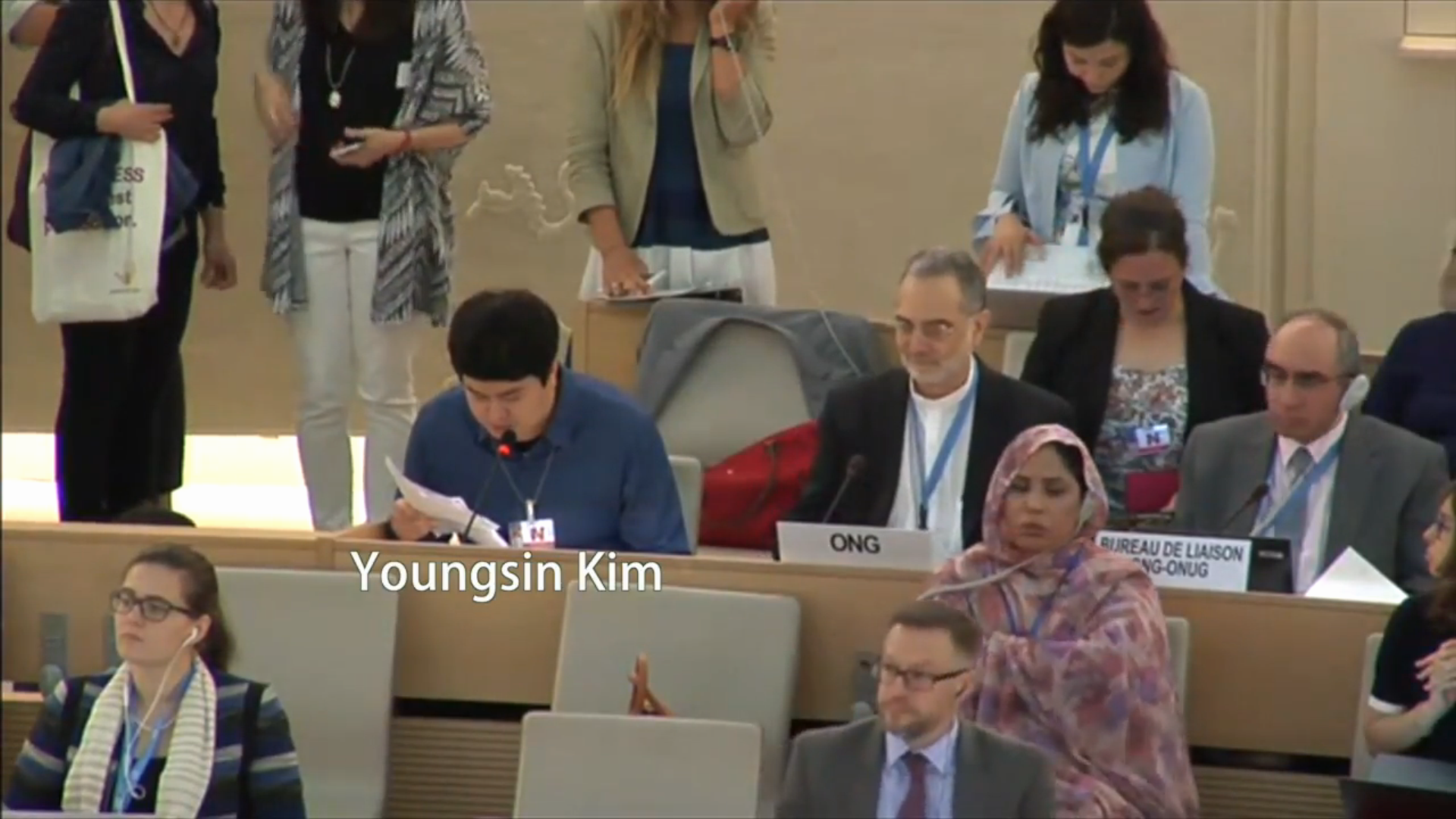
Youngsin Kim, who was poisoned by methanol when he worked for a third-tier supplier for Samsung Electronics in South Korea, spoke on behalf of other victims. He expressed his disappointment that the government’s response to the Working Group’s report did not mention victims of occupational hazards like himself. Taeyoung Yoo of MINBYUN-Lawyers for a Democratic Society, and Taewook Kim of the Korean Metal Workers Union (an affiliate of the Korean Confederation of Trade Unions) presented union-busting issues in supply chains, and gave examples of companies such as Hyundai Motors and Valeo being directly involved in union-busting in their first-tier suppliers but faced no punishment. Donghyun Kim of Korean TransNational Corporations Watch analysed occupational accidents in supply chains. He pointed out that while occupational health and safety remains a problem in Korea, lead companies get even less legal responsibility as the subcontracting structure becomes complicated and multi-layered through outsourcing of dangerous tasks to suppliers.

Delivering a perspective from Mexico, Elena Villabuerte of ProDESC discussed a range of issues in the country, including the low penetration rate of independent unions and the fact that a large number of unions are yellow unions that protect the interests of management.
Finally, Kirstine Drew of the Trade Union Advisory Committee to the OECD (TUAC) explained the OECD Guidelines for Multinational Enterprises, emphasising that governments have the responsibility to ensure that businesses comply with the guidelines, while businesses have the responsibility to address impacts on workers regardless of their contract situation in supply chains. She also explained due diligence and National Contact Point mechanisms as ways of strengthening corporate responsibility.
Freedom of Expression in South Asia
FORUM-ASIA organised a side event on freedom of expression in South Asia on 14 June 2017. This was moderated by Anriette Esterhuysen of the Association for Progressive Communications (APC), which co-sponsored the side event.
Gayatri Khandadai of APC highlighted the alarming trend of legitimising the restriction of freedom of expression in Asia. She said that human rights defenders, journalists, and political dissidents are faced with new kinds of threats and restrictions. She also discussed issues related to online surveillance and privacy. In discussing the situation in India, she stated that anti-nationalism and nationalism have been the concepts for silencing and restricting freedom of expression, and that the cyber law is vaguely applied to attack those who exercise their right to expression. Furthermore, the state has been complicit in online attacks as the President’s Twitter account follows individuals who incite hatred and violence, including rape, implying that these practices are acceptable.
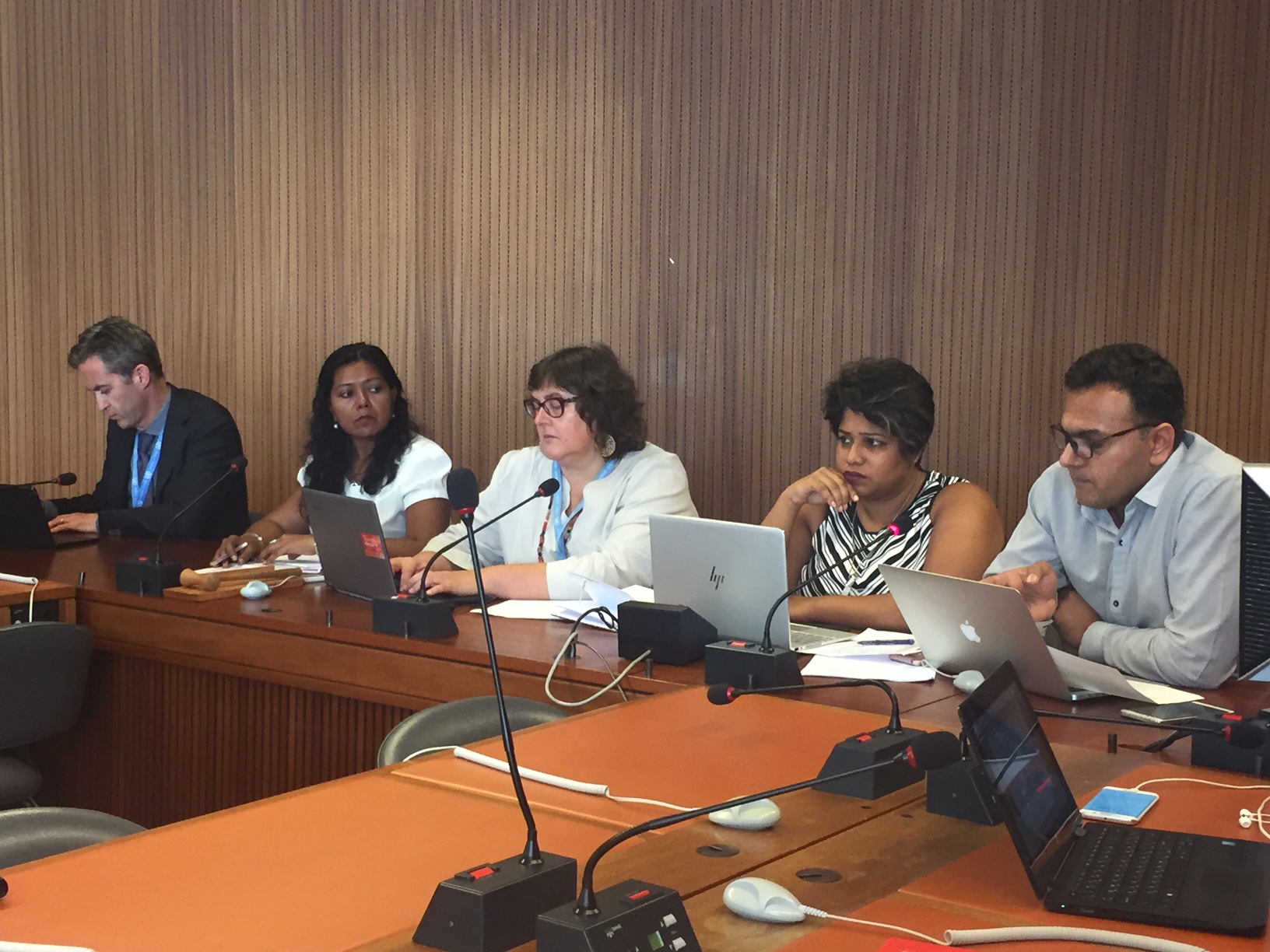
Shahindha Ismail of the Maldivian Democracy Network discussed restrictive legislation, including the defamation act and counterterrorism act. She gave examples of the abductions, imprisonment, and murders of people who have openly criticised the government and extremist activities in the Maldives. She also discussed online harassment against human rights defenders and individuals who call for secularism and tolerance in the Maldives, and the failure of the government to protect these defenders and their right to expression.

Haroon Baloch of Bytes for All, a digital rights organisation in Pakistan, discussed government crackdowns against social media activists under the problematic cybercrime law. While the legal situation of freedom of expression in Pakistan is a constitutional right, the government imposes unreasonable restrictions on the pretext of national security. Furthermore, over 200 bloggers and activists are being monitored because of their online criticism.
David Kaye, the Special Rapporteur on the promotion and protection of the right to freedom of opinion and expression made closing remarks highlighting the trend of moving online threats to offline spaces in the region. He further encouraged using the recommendations made by his mandate when challenge legal restrictions.
Religion and Expression Online in Asia
FORUM-ASIA co-sponsored a side event on religion and expression online, organised by the Association for Progressive Communications (APC), on 15 June 2017. The side event gave human rights defenders the opportunity to highlight challenges in the exercise of expression and religion in online spaces, and address the issue of the criminalisation of speech termed as ‘blasphemy’. This was moderated by Anriette Esterhyusen of APC.
Haroon Baloch of Bytes for All discussed the situation in Pakistan and how existing laws give a space for non-state actors to take action against people who exercise their right to expression. There have also been cases of people being given death sentences for exercising expression related to Islam. He stated that the situation can also be problematic for women for their expression on religion or get involved in conflicts with religious leaders.
Chinmayi Arun of the Center for Communication Governance discussed the India context, in which the law has failed hate speech in terms of religion and also in terms of censorship. Her research has focussed on legal standards used to criminalise hate speech in India, including all laws that affect speech. She emphasised that the issue lies in the bureaucracy of the implementation of laws, and that the overall study of hate speech should include how legal institutions operate and how the state chooses not to use the law. She added that, in India, the state has refused to take a stand on or respond to many incidents of religion-based violence.
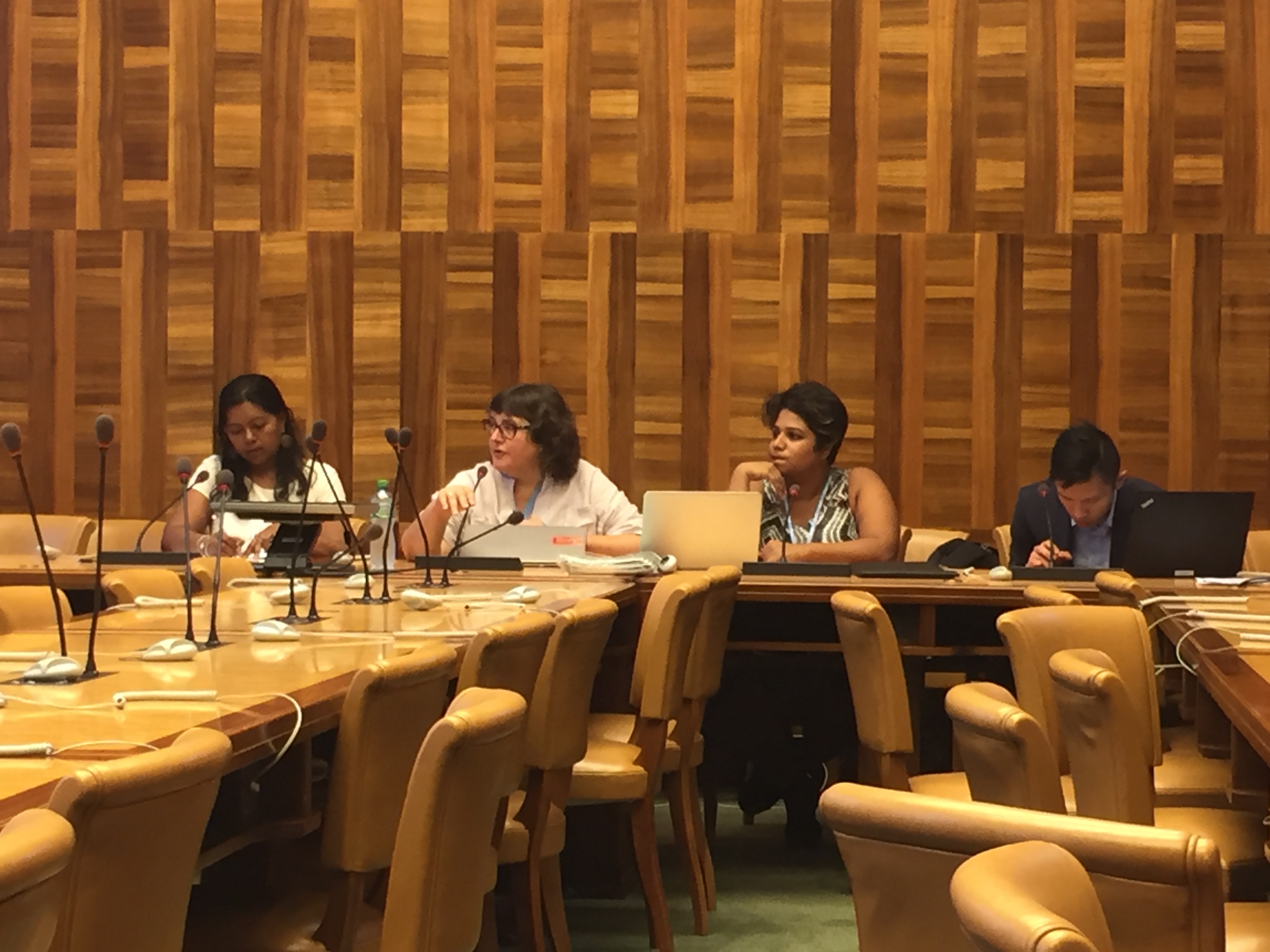
Shahindha Ismail of the Maldivian Democracy Network stated that the underlying issue in the Maldives is the interpretation of secularism by extremist and radial groups, which equate secularism with atheism and label it as anti-Islamic. As a result, these groups believe that Islam would allow for threats outside the penal system and that anyone deemed anti-Islamic or promoting secularism could be deemed as fair play for killings. She gave examples of murdered human blogger Yameen Rasheed, disappeared journalist Ahmed Rilwan, and murdered MP Afrasheem Ali. Furthermore, she discussed the selective application of laws over social media content, which have condoned the spread of extremism and radicalism and online threats.
Gayatri Khandhadai of APC discussed region-wide trends on threats to expression on religion online. These include the false sense of religions having rights, legitimacy of blasphemy laws, letting the mob do the job, and politicisation of religion, as well as implicit and not so implicit violations of the state when it comes to backlash on hate speech and blasphemy. Furthermore, she expressed disappointment on the Rabat Plan of Action and its failures to refer to women and to address current challenges.
Amos Toh, legal advisor to the Special Rapporteur on the right to freedom of opinion and expression explained the processes of resolution 16/18 and the Rabat Plan of Action, and showed a stark contrast to between developments into national law and realities on the ground. He emphasised that criminalisation should only happen when there is incitement to imminent violence, and that there should be differentiation among what kind of speech should be criminalised, what kind of speech deserve civil suits but not criminal action, and what kind of speech might be offensive but not require state intervention.

